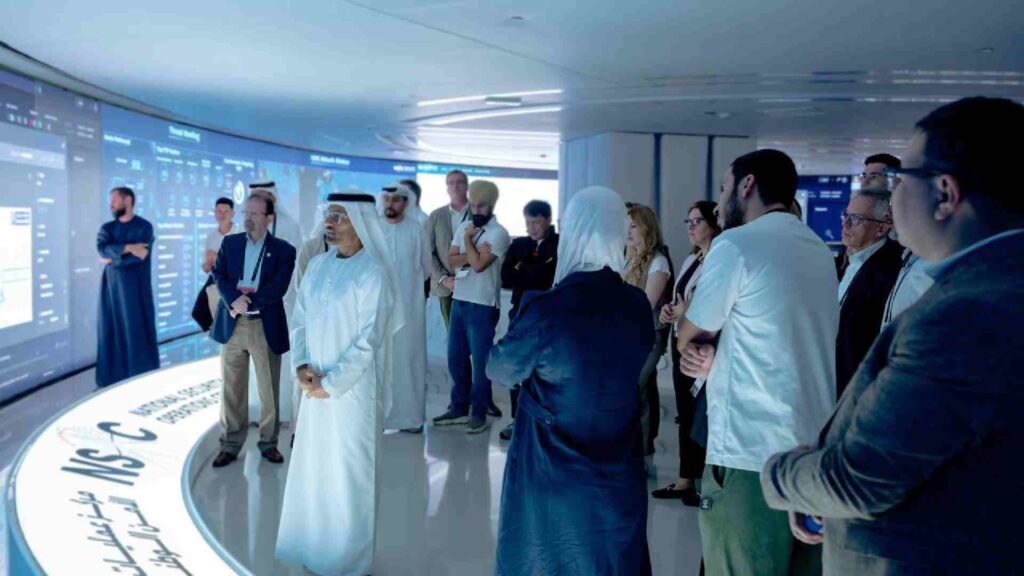Tech News
Digital Identity: Enabling MEA eGoverment Entities to Enhance Experiences while Cutting Costs

By Uday Shankar Kizhepat, Vice President and General Manager- Middle East and Africa Region, WSO2
We live digitally. Much of our professional work is digital, as is much of our leisure time. Our commercial activity – shopping, service subscription, banking, and more – is digital. And our government is digital. No doubt governance itself requires the wisdom of individuals. But the transactional part – filing, requesting, registering, licensing, and so on – is digital. Governments in the Middle East and Africa (MEA) know they have an opportunity, with today’s technologies, to streamline transactional government functions while cutting costs.
One way to do this is to introduce digital identities. By allowing each citizen to be recognized by their “bytes essence,” public authorities open the door to transformative programs that use these trusted online personas to get things done reliably and rapidly. Many regional nations are acknowledging the potential of digital ID systems and have cultivated track records for themselves in areas such as boosted citizen engagement and enhanced accuracy of outcomes.
Digital IDs offer a practical means to ensure useability when new e-government services come online. Identity verification, service accessibility, and data protection are three major, long-standing challenges encountered by regional governments on their digital transformation journeys. The digital ID solves all of them. It offers an elegant solution to the verification issue, obviously, but its simplicity enhances accessibility, and its security features protect data.

The ’Guarantee’
The digital identity may look straightforward, but its elegance is built on a toolbox of advanced technologies such as biometrics, encryption, and blockchain. These building blocks come together to give a guarantee of authenticity when an individual presents their credentials to an online gatekeeper. And we should not use the word “guarantee” lightly. It lies at the core of the viability of any authentication system offered by a government. When waved through the door, verified users can access tax history and health records. They can pay bills or register with a government agency. If verification is erroneous, a host of problems can arise.
The digital ID is a holistic, citizen-centric approach that strikes a balance between security and performance and yet does not compromise either. It eliminates bureaucratic bottlenecks and elevates the citizen experience without the public-sector agency ever relinquishing control of any part of the process. But how? How do digital IDs allow government services to operate at peak efficiency and grant seamless access to every citizen while not faltering when it comes to risk management? How do responsive, always-on services guarantee privacy and security? Well, the answer comes full circle, back to digital transformation.
Governments in the Arab Gulf region mention digital transformation frequently in published guidelines that map the way to economic diversification. These same guidelines apply to the government itself, which must set about transforming systems, processes, and functions to prepare for digital IDs and the world they promise – one in which a digital service provider can offer both seamless access and security. Complexities come from the scale and interconnectedness of operations, and the need for every shred of data, every machine-to-machine process, and every user session to be secure. Regulatory obligations must be juggled with budgetary constraints while technology leaders play intermediary to vying stakeholder factions within the organisation. It is easy to see how challenging it might be to maintain interoperability and data-sharing in such a fraught environment.
Of course, none of this will deter government organisations in the MEA region. They know what the hurdles are, but they also know what is to be gained – smoother services that cost less to provide while engendering greater citizen trust and in fact are leading the way in some of these digital initiatives. Remember, regional governments also know that the expectations of their citizens have, in a very real sense, undergone a digital transformation of their own.

Success Stories
If we cast our eyes around the region, we can see digital ID-centric transformation in action already. Some government organisations in the Middle East have introduced biometric facial recognition as part of digital identity phase-ins and are using the system for secure digital document storage. Also in current use are systems that allow single, mobile-based logins. In these countries, the government’s identity access management (IAM) system undergoes a sweeping overhaul that allows the unification of credentials data to provide secure digital identity.
In the Asian subcontinent, we find a government that directed its telecoms ministry to build a national information exchange layer using an API. Strict identity management was rolled out as part of this ambitious project. With digital identity in place, the government can enable slicker collaboration between its departments and enhanced efficiency in outputs. It can do all this while optimising data access and consumption, which empowers analysts to deliver more actionable insights to stakeholders across agencies and ministries.
In Africa, one country showed its peers how an integrated identity and access management solution can be used for risk-based authentication, single sign-on, multi factor authentication, and user self-service. The solution was designed to minimise the risk of identity theft, but it was also (through single sign-on) able to reduce complexity when onboarding and offboarding users.
Conflict Resolved
If digital solutions are the future of government, then digital identity is the future of public-sector cybersecurity and risk management. Governments in the region have been trying for years now to transform service delivery and engender citizen trust and engagement, but security has always been in conflict with agility. Having leveraged digital identity, authorities rid themselves of the downsides and reap rewards such as those described here. These regional successes underscore not only the profound impact digital transformation can have on society, but the indispensable role digital identity will play in delivering those efficiencies in a way that promotes trust.
Tech News
Nemetschek and Saudi Facility Management Association Sign Strategic MoU to Advance Smart and Sustainable Facilities Management in Saudi Arabia

Nemetschek Arabia, part of the Nemetschek Group, one of the world’s leading software providers for the Architecture, Engineering, Construction and Operations (AEC/O) industry, has signed a strategic Memorandum of Understanding (MoU) with the Saudi Facility Management Association (SFMA) to support the advancement of the facilities management sector in the Kingdom through innovation, knowledge exchange and workforce development.
The collaboration reflects a shared commitment to supporting Saudi Arabia’s Vision 2030 by enhancing industry standards, accelerating digital transformation and building national capabilities within the facilities management ecosystem. Under the MoU, both parties will collaborate closely to exchange expertise and best practices, develop competencies and introduce advanced, technology-driven approaches to facilities management.
Key areas of cooperation include the organization of joint workshops, seminars and training programs, participation in industry exhibitions and events, and collaboration on research and development initiatives aimed at introducing innovative solutions for the FM sector. The partnership will also explore the execution of pilot projects across the public and private sectors, with a focus on smart facilities management, digital twins and data-driven operations.
In addition, Nemetschek Arabia and SFMA will work together to support sustainability initiatives, provide access to educational materials, offer technical and professional consultancy, and contribute to the development of national talent through targeted training and capacity-building programs.
Speaking on the collaboration, Yves Padrines, Chief Executive Officer of the Nemetschek Group, noted that facilities management is a critical pillar in maximizing the long-term value, sustainability and performance of the built environment. “As Saudi Arabia advances its Vision 2030 ambitions, digitalization across the full asset lifecycle, from design and construction to operations, has never been more important. Our collaboration with the Saudi Facility Management Association reflects Nemetschek’s commitment to supporting the Kingdom’s transformation by enabling smarter, data-driven facilities through open, interoperable technologies and strong industry partnerships.”
Muayad Simbawa, Managing Director of Nemetschek Arabia, added that facilities management is entering an era defined by digitalization, sustainability and intelligent operations. “This strategic collaboration with the Saudi Facility Management Association reflects our shared belief that technology, skills and collaboration are essential to unlocking the full potential of the FM sector. By combining Nemetschek’s expertise in digital twins and lifecycle solutions with SFMA’s industry leadership, we aim to support smarter assets, stronger capabilities and a more resilient facilities management ecosystem aligned with the Kingdom’s Vision 2030.”
Eng. Ayed bin Awad Al-Qahtani, Chairman of the Board of the Saudi Facility Management Association, said: “Our mission at SFMA is to set the gold standard for facility management in the Kingdom. By partnering with a global technology leader like Nemetschek, we are ensuring that our professionals have access to the most advanced tools and international expertise available. This collaboration will catalyze innovation, drive research, and, most importantly, equip our national talent with the competencies required to manage the Kingdom’s mega-projects with precision and excellence.”
The MoU underscores both organizations’ commitment to advancing the facilities management profession in Saudi Arabia and supporting the Kingdom’s transformation agenda through innovation, knowledge sharing and long-term ecosystem development.
Tech News
SHURE ANNOUNCES MICROFLEX® ADVANCE™ MXA320 TABLE ARRAY MICROPHONE

WHAT:
As part of the innovations that were on display at this year’s ISE, Shure debuted the new Microflex Advance MXA320 Table Array Microphone, in line with its enterprise collaboration portfolio expansion strategy. Featuring the same familiar industrial design as the popular MXA310 that it supersedes, it is designed to be ideal for IT and AV professionals seeking an easy to deploy, low-profile and scalable table solution. Packed with technological innovation, this next evolution of Shure’s table array microphone platform offers a reliable networked audio device with minimal out-of-the-box setup for all types of conferencing spaces.
The new MXA320 provides an improved audio experience for the end user thanks to enhanced Steerable Coverage™ Technology, ensuring clear audio capture during team meetings. Certified for Microsoft Teams and Zoom, it features onboard IntelliMix® processing, streamlined configuration through Designer software, ShureCloud compatibility, and an integrated mute button function all housed in a compact, low-profile design.
“In dynamic markets like the Middle East and Africa, the new Microflex Advance MXA320 delivers outstanding clarity and consistency that unlocks more inclusive and effective collaboration, reinforcing audio as the foundation of modern enterprise communication,” noted Yassine Mannai, associate director sales and marketing, Shure MEA.
WHEN:
The new Microflex Advance MXA320 Table Array Microphone will be available in Spring 2026 through Shure official channel partners, including the Middle East and Africa regions
WHERE:
Shure’s Microflex Advance MXA320 Table Array Microphone was showcased for the first time at ISE 2026, February 3rd – 6th in Barcelona. Booth #3M300. For more information, contact your Shure sales representative.
Tech News
POLYNOME AI ACADEMY AND ABU DHABI SCHOOL OF MANAGEMENT EXPAND CAIO PROGRAM, TAP GLOBAL TECH LEADERS

Polynome AI Academy and ADSM have unveiled the expanded global list of instructors for the second cohort of their Executive Program for Chief AI Officer (CAIO), featuring leaders from NVIDIA, Mubadala, BCG, G42, AI71, and leading research institutions.
The intensive program, running April 10–21, in Abu Dhabi, was created in response to a growing need among governments and large enterprises for structured AI leadership. It aims to equip Chief AI Officers and senior executives with the governance frameworks, operating models, and decision-making structures required to lead AI at both organizational and national scale.
“The first cohort confirmed what we’ve long believed: the CAIO role requires a dedicated program built for the realities of leading AI at scale,” said Alexander Khanin, Founder of Polynome Group. “Executives came to Abu Dhabi and left with actionable strategies they are already putting into practice. The tools are ready, and by 2027, AI is expected to guide half of all business decisions. The focus now is on equipping organizations with the framework to confidently execute AI-driven decisions. Cohort 2 builds on this momentum with a refined curriculum and fresh global perspectives.”
“The first cohort demonstrated the demand we anticipated; top executives across the region recognize that AI strategy cannot simply be delegated,” commented Dr. Tayeb Kamali, Chairman of Abu Dhabi School of Management. “The program continues to evolve, providing an immersive experience that equips leaders with the skills and insights to navigate AI adoption successfully and translate technological potential into real business impact.”
Inaugural Cohort: Impact & Insights
The first Executive Program for Chief AI Officer, held in November 2025 at Abu Dhabi School of Management, enrolled 35 C-suite executives and senior technology leaders. Participants completed 10 modules covering AI strategy, sovereign AI infrastructure, governance frameworks, agentic systems, Arabic NLP, AI investment strategy, and enterprise deployment methodology — combined with site visits to the UAE Cybersecurity Council, Core42’s Khazna Data Centers, and ADNOC, as well as executive roundtables with policymakers.
“The Executive Chief AI Program is unlike any course I’ve attended,” said Dr. Noura AlDhaheri, Chairman, DNA Investments. “It brings us directly to the AI creators, experts, and leaders, giving insight into the real challenges and the evolving landscape of AI. One of the most important lessons is that this field is constantly changing, so we must continually reinforce our knowledge and update our teams. AI is set to transform the way we do business; it’s a truly historic moment, and staying ahead is essential.”
The Global AI Experts Driving Cohort 02
The confirmed instructors list for Cohort 02 brings together leading voices from across the global AI ecosystem, spanning sovereign investment, national-scale AI architecture, enterprise strategy, and frontier research. Among confirmed instructors are Dr. George Tilesch, Founder & President of PHI Institute for Augmented Intelligence; Dr. Andrew Jackson, Group Chief AI Officer at G42; Prof. Merouane Debbah, Professor & 6G Lab Director at Khalifa University; Prof. Nizar Habash, Professor at New York University Abu Dhabi; Dr. John Ashley, Chief Architect at AI Nations and Director of NVIDIA AI Technology Centers; Charbel Aoun, Smart City & Spaces Director – EMEA at NVIDIA; Jean-Christophe Bernardini, Partner & Managing Director at Boston Consulting Group (BCG); Faris Al Mazrui, Head of Technology at Mubadala Investment Company; Chiara Marcati, Chief AI Advisory and Business Officer at AI71; Jorge Colotto, Founder and CEO of AIdeology.ai. Additional instructors will be announced in the coming weeks; and Marco Tempest, Director of Innovation Hub at ETH Zürich.
Program Structure
The Executive Program for Chief AI Officer is a 10-day intensive comprising 10 modules, executive seminars, case labs, operating model workshops, site visits to UAE AI institutions, including Core42’s Khazna data center, policymaker roundtables, and lifetime access to the CAIO alumni network. The program is designed for CAIOs, CTOs, CIOs, CISOs, public sector advisors, and senior digital transformation executives.
-

 Tech News2 years ago
Tech News2 years agoDenodo Bolsters Executive Team by Hiring Christophe Culine as its Chief Revenue Officer
-

 VAR10 months ago
VAR10 months agoMicrosoft Launches New Surface Copilot+ PCs for Business
-
News10 years ago
SENDQUICK (TALARIAX) INTRODUCES SQOOPE – THE BREAKTHROUGH IN MOBILE MESSAGING
-

 Tech Interviews2 years ago
Tech Interviews2 years agoNavigating the Cybersecurity Landscape in Hybrid Work Environments
-

 Tech News7 months ago
Tech News7 months agoNothing Launches flagship Nothing Phone (3) and Headphone (1) in theme with the Iconic Museum of the Future in Dubai
-

 VAR1 year ago
VAR1 year agoSamsung Galaxy Z Fold6 vs Google Pixel 9 Pro Fold: Clash Of The Folding Phenoms
-

 Tech News2 years ago
Tech News2 years agoBrighton College Abu Dhabi and Brighton College Al Ain Donate 954 IT Devices in Support of ‘Donate Your Own Device’ Campaign
-

 Automotive1 year ago
Automotive1 year agoAGMC Launches the RIDDARA RD6 High Performance Fully Electric 4×4 Pickup


















